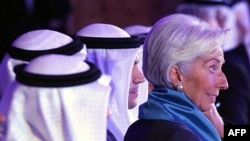The International Monetary Fund says one key aim of its decision to add China’s yuan to a global basket of foreign currencies is to help promote reform of the Chinese economy and financial sector. But the announcement is already raising questions about just how much Beijing is committed to such reforms.
Speaking at the IMF’s headquarters in Washington D.C. on Monday, managing director Christine Lagarde made it clear that reform expectations were a crucial part of the decision.
Lagarde notes that the inclusion of the Chinese yuan or RMB into the basket along with the Euro, dollar, pound and Japanese Yen was “clearly an important milestone in a journey that has begun months, if not years, ago, a journey which is a transition to a more market driven” framework for the Chinese economy.
She adds that the journey will indeed continue “and will include certainly more reforms” in addition to those that have been added in the last few months.
Since President Xi Jinping came to office, he has talked a lot about promoting reform. Authorities had pledged to make state-backed companies more competitive, create a better business climate for foreign businesses and investments and open the country’s financial markets. But increasingly there are concerns that government policies are moving in the opposite direction. Critics saw this year’s massive government intervention to prop up the stock market as a sign that Beijing is not embracing a more open economy.
Currently, China’s currency is not freely traded on the global market. Beijing has been taking steps in recent years to gradually increase ways the currency can be exchanged and has pledged the RMB will be fully convertible by 2020.
Symbolic gesture
Some analysts say the acceptance into the basket is just a formal recognition of China’s status as the world’s second largest economy and globe’s biggest trader.
“From a technical point of view, I think the RMB is still too small, controlled and lacking in transparency truly to be a reserve currency with the same standing as the other four,” says Michael Pettis, a finance professor at Peking University.
The decision to add China to the basket will not take effect until October 1, 2016, giving the IMF some time to observe further efforts on the reform front.
Xu Bin, a professor of finance and economics at the China Europe International Business School in Shanghai agrees that the decision is largely symbolic, but what really matters is how China uses this opportunity to speed up reforms.
He says that while it is unclear how far the Chinese government will go on the path of reform, there is expectation that the decision will move China more towards a financially open economy.
“Arguably the RMB may not have met all the requirements for entering the SDR basket now, but it is anticipated that the RMB will meet all these requirements within the next five years.” Xu says. “I think the IMF made a forward-looking decision, which is strategically sound.”
Smart decision
Speaking in Beijing at the European Chamber of Commerce, Jin Liqun, the president designate of the soon to be formed Asian Infrastructure Investment Bank praised the IMF for making as he put it “one smart decision.”
The decision, he says, “has put huge responsibility on China to make sure that the RMB is stable, transparent and credible international currency.”
But just as much as the move will provide opportunities for China, it will also present new challenges as well, especially if reforms are carried out and controls on the currency are loosened.
Currently, China only allows its currency to trade in a daily fixed band. That has meant predictability. Jorg Wuttke, President of the European Chamber says those days may soon be over.
The “inclusion brings volatility to the RMB and hence for companies, I think they will have to realize that the RMB is not a one game bet,” Wuttke says, adding that companies will have to be more careful of that.
Stability pledged
On Tuesday, however, China’s central bank pledged to keep the currency stable, adding that it would not rule out the use of intervention to address what it called abnormal movements.
Some analysts have already warned that the move could intensify a flight of capital from the country that has already reached high levels in the past two years.
“As the RMB rate becomes more flexible, there will be increasing risks of capital flight,” says CEIBS’s Xu Bin.
The People’s Bank of China has called the decision an endorsement of the country’s economic developments and recent reforms.
The Beijing Youth Daily notes that the decision made China the first developing country to be added to the basket. The decision, it argued would help further open up and relax restrictions on foreign capital, speeding up exchange rate reforms.
The 21st Century Business Herald hailed the decision, calling it the most important step toward integrating China into the global market since its membership in the World Trade Organization in 2001.
But the newspaper argued that it was unlikely that China’s currency would become freely convertible immediately or that other countries might quickly build up reserves of the RMB.
IMF Bets on China’s Resolve to Reform

BEIJING —



